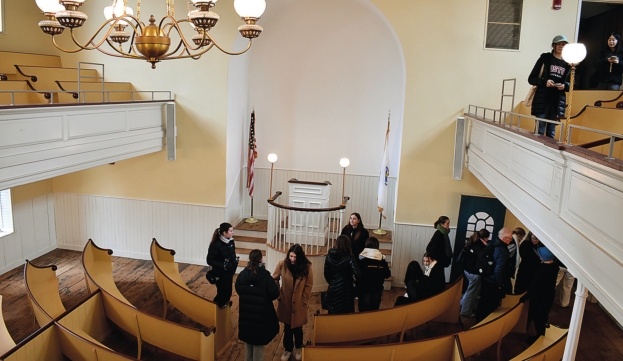
Inside the African American Meeting HouseTwo Beacon Hill museums expect to lose federal grants that, combined, total over $400,000, due to the impact of an executive order titled “Restoring Truth and Sanity to American History.”
The executive order prompted the laying off of nearly every employee of the Insitute of Museum and Library Services (IMLS), a federal agency that funded American libraries and museums.
A three-year, $500,000 IMLS grant to the Boston Museum of African American History (MAAH) has been cut two years short, amounting to an expected loss of $340,000. In its first year, the grant was used to hire additional staff and expand educational programming.
At the West End Museum, a $75,000 IMLS grant meant for programs that would have decreased the organization’s reliance on federal funding hangs in limbo.
“I’m
not super clear on what having a grant from an organization that has no
staff really means. It’s not like I can file a reimbursement,”
Executive Director Sebastian Belfanti said in an interview.
The
MAAH and the West End Museum, among many other institutions nationwide,
have drawn the ire of the President for what an unnamed Trump
administration official told Politico amounts to, “ensure that
hard-earned tax dollars are not diverted to discriminatory DEI
initiatives or divisive anti-American programing.”
Trent
said that "this museum’s history is American history.” On the floor of
the African Meeting House, Black men first gained the right to join the
United States’ military. In the pulpit of the oldest Black church still
standing, women, of any race, first spoke publicly on political topics.
The charters of the first abolitionist groups were signed under its
roof.
“Slavery is a
part of American history. You do not get the development of this country
without slavery,” Trent said. “History is not just about successes or
achievements. It’s about tragedies. It’s about failures. It’s about
thriving. It’s about surviving.”
Structural
upkeep of the historic facility is not dependent on federal dollars,
but the Trump administration’s far-reaching executive orders aimed at
minority institutions began as far back as the week of his inauguration.
Speculation suggests they will continue into the future.
“We’re
already seen slight declines [in private donations], especially in
February. When the executive orders surrounding diversity, equity and
inclusion went out, we saw a steep decline in facility rentals. We saw a
steep decline in admission numbers,” Trent said.
The
West End Museum highlights how, prior to urban renewal efforts of the
late ‘50s, the West End was the most diverse neighborhood in Boston,
home to wealthy English colonists, a free Black working class and all
kinds of European immigrants. Today, the West End, one of Boston's most
popular tourist destinations, contributes to the whitewashing of the
city’s diverse history by the displacement of those communities to
lesser-trodden neighborhoods. The West End Museum’s reminder of that
past falls under the Trump administration’s definition of “DEI.”
“I
accept that based on their definitions, the history that the West End
Museum teaches is functionally a revisionist history, but those
revisions are not negative,” Belfanti said. “There has been for the last
30ish years now a lot of progress in our understanding of American
history that has moved it in the direction of honesty.”